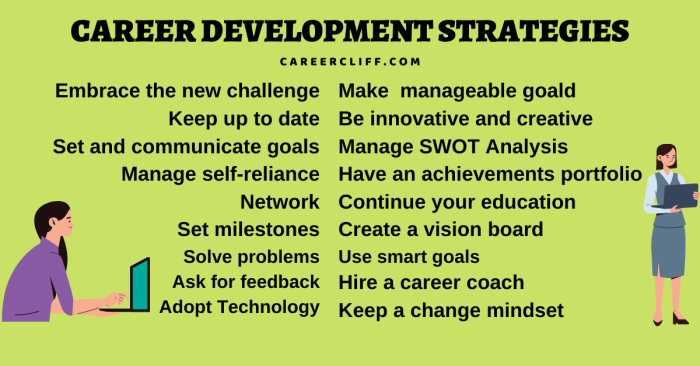Career Growth Strategies, the key to unlocking your full potential and propelling your career to new heights, are essential tools for anyone striving for success in the professional world. Whether you’re just starting out or looking to advance in your current role, implementing effective strategies can make all the difference in achieving your goals.
In this guide, we will delve into the importance of these strategies, explore different types, provide insights on implementation, and offer tips on overcoming common challenges along the way. Get ready to take charge of your career growth and set yourself up for long-term success.
Importance of Career Growth Strategies
In today’s competitive job market, having effective career growth strategies is crucial for professional development. These strategies help individuals navigate their career paths, set goals, and make progress towards achieving success in their chosen field. By proactively planning and implementing these strategies, individuals can not only enhance their skills and knowledge but also increase their opportunities for advancement and growth.
Positive Impact of Effective Career Growth Strategies
- Setting Clear Goals: Career growth strategies help individuals define their long-term career goals and create a roadmap for achieving them. This clarity enables them to focus their efforts and make informed decisions that align with their objectives.
- Continuous Learning and Development: By investing in continuous learning and skill development, individuals can stay relevant in their field and adapt to changing industry trends. This proactive approach enhances their expertise and increases their value in the job market.
- Building a Strong Network: Networking is an essential aspect of career growth, and effective strategies can help individuals expand their professional connections. Building relationships with peers, mentors, and industry experts can open doors to new opportunities and provide valuable support and guidance.
- Seizing Opportunities: Career growth strategies empower individuals to identify and seize opportunities for advancement. Whether it’s taking on new projects, pursuing additional certifications, or seeking promotions, these strategies help individuals make bold career moves that can propel them to new heights.
Types of Career Growth Strategies

In the journey of career growth, various strategies can be employed to enhance professional development and unlock new opportunities. Let’s explore different types of career growth strategies that individuals can leverage to advance in their careers.
Skill Development
Skill development is a crucial aspect of career growth, as acquiring new skills and enhancing existing ones can open doors to new opportunities. This can involve taking courses, attending workshops, obtaining certifications, or seeking mentorship to develop technical or soft skills that are in demand in the industry.
Networking
Networking plays a vital role in career growth, as building relationships with professionals in your field can lead to valuable connections, collaborations, and potential job opportunities. Attending industry events, joining professional organizations, and engaging on social media platforms can help expand your network and create new possibilities for career advancement.
Goal Setting
Setting clear and achievable goals is essential for career growth. By defining specific objectives and outlining a plan to achieve them, individuals can stay focused, motivated, and track their progress. Whether it’s aiming for a promotion, increasing productivity, or transitioning to a new role, goal setting provides a roadmap for success in the professional realm.
Personal Branding
Personal branding is a key career growth strategy that involves establishing a unique identity and reputation in the industry. By showcasing your skills, expertise, and values through online platforms, professional profiles, and personal interactions, you can differentiate yourself from others, attract opportunities, and build a strong personal brand that resonates with employers and colleagues.
Short-term vs. Long-term Strategies
When it comes to career growth, individuals can benefit from a combination of short-term and long-term strategies. Short-term strategies may focus on immediate goals, such as acquiring a new skill or completing a project, while long-term strategies involve planning for future career milestones, such as pursuing advanced education, gaining leadership experience, or transitioning to a higher position. Balancing both short-term and long-term strategies can ensure continuous growth and progression in one’s career journey.
Implementing Career Growth Strategies

To effectively implement career growth strategies, it is essential to create a step-by-step plan and remain committed to the process. This involves setting clear goals, identifying areas for improvement, and taking actionable steps towards achieving career advancement.
Role of Mentorship and Continuous Learning
Mentorship plays a crucial role in guiding individuals through their career growth journey. A mentor can provide valuable advice, share experiences, and offer support in navigating challenges. Continuous learning is also vital as it helps individuals stay updated with industry trends, develop new skills, and adapt to changing work environments.
- Seek out a mentor who has experience in your field and can provide valuable insights and guidance.
- Take advantage of networking opportunities to connect with professionals who can offer advice and support.
- Invest in ongoing education and training to enhance your skills and stay competitive in the job market.
- Attend workshops, seminars, and conferences to expand your knowledge and network with industry experts.
Remember, learning is a continuous process, and seeking mentorship can significantly impact your career growth.
Resources and Tools for Execution
Utilizing resources and tools can streamline the implementation of career growth strategies and enhance your professional development. From online courses to networking platforms, there are various resources available to support your career advancement.
- Online learning platforms such as Coursera, LinkedIn Learning, and Udemy offer a wide range of courses to help you develop new skills and knowledge.
- Professional networking sites like LinkedIn provide opportunities to connect with industry professionals, join relevant groups, and showcase your expertise.
- Career development books and podcasts can offer valuable insights, tips, and strategies for advancing your career.
- Utilize career coaching services to receive personalized guidance and support in setting and achieving your career goals.
Overcoming Challenges in Career Growth: Career Growth Strategies
When striving for career growth, individuals often encounter various obstacles that can hinder their progress. It is essential to identify these challenges and develop strategies to overcome them in order to achieve success in one’s professional journey.
Balancing Work and Personal Life, Career Growth Strategies
One common challenge faced by individuals pursuing career growth is finding a balance between their work responsibilities and personal life. Long work hours and demanding deadlines can often lead to burnout and neglect of personal relationships and self-care.
- Set boundaries: Establish clear boundaries between work and personal time to ensure that you prioritize self-care and maintain healthy relationships outside of work.
- Time management: Utilize effective time management techniques to maximize productivity during work hours, allowing you to create space for personal activities and relaxation.
- Seek support: Don’t hesitate to ask for help from colleagues, friends, or family members when feeling overwhelmed. Building a support system can help alleviate stress and prevent burnout.
Overcoming Imposter Syndrome
Imposter syndrome, the feeling of inadequacy and self-doubt despite evident success, can be a significant obstacle to career growth. Overcoming this mindset is crucial in order to pursue opportunities for advancement and development.
- Recognize achievements: Take time to acknowledge and celebrate your accomplishments, no matter how small they may seem. Remind yourself of your skills and capabilities to combat feelings of inadequacy.
- Seek feedback: Request feedback from mentors, supervisors, or trusted colleagues to gain external validation of your skills and contributions. Constructive feedback can help boost confidence and dispel doubts.
- Professional development: Invest in continuous learning and skill development to enhance your expertise and confidence in your abilities. Engaging in workshops, courses, or networking opportunities can help you grow professionally.
Navigating Career Transitions
Transitioning to a new role, industry, or career path can present challenges such as unfamiliarity, uncertainty, and fear of failure. Overcoming these obstacles requires adaptability, resilience, and a proactive approach to change.
- Research and preparation: Conduct thorough research on the new role or industry you are transitioning to in order to equip yourself with the necessary knowledge and skills. Preparation can help alleviate uncertainties and build confidence.
- Networking: Expand your professional network by connecting with individuals in the desired industry or role. Networking can provide valuable insights, opportunities, and support during the transition process.
- Embrace change: Embrace the challenges and opportunities that come with career transitions as opportunities for growth and development. Maintain a positive mindset and willingness to adapt to new environments and responsibilities.
